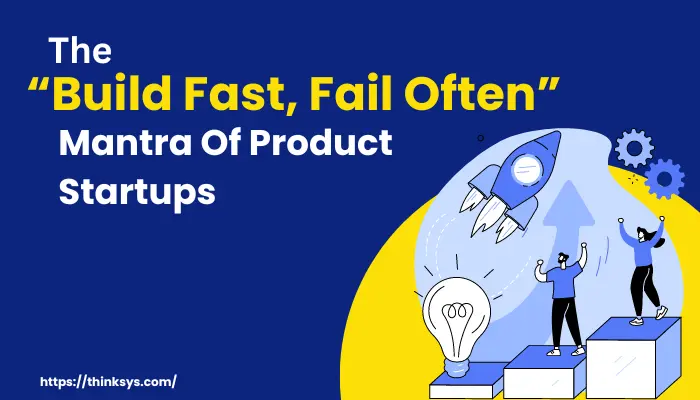The "Build Fast, Fail Often" Mantra Of Product Startups
'Failure is simply the opportunity to begin again, this time more intelligently.'-Henry Ford
Today if you have a strong and viable idea then converting that idea into a product that addresses a viable business opportunity is relatively easy. With crowdfunding and angel investment booming, securing the finances to get rolling has also become easier than it used to be. But this is just the first step in the startup journey. Entrepreneurs realize that business is risky in general.
However, they are fueled by the innate belief that their skills will win out in the end. This somewhat unreasonable level of optimism and confidence is essential for an entrepreneur. But are these ingredients enough to ensure the long-term success of a startup? The truth is that it is equally important to build a product that is ready for success. And it is also true that sometimes getting the product right may take a few extra tries than you may have thought necessary when you started.

The Lean Start-Up methodology, as outlined by Eric Ries is a great way for product startups to ensure that their product is ready for the market -eventually. Ries propounds that today, the possibility is very slim that a company can't build what it initially thought it would because of technology constraints. It is the market risk that will be the main concern.
Product startups often conceptualize, design, and build a product before assessing its impact and reaction from the market. This ends up taking time, effort, scarce engineering resources, and yes, money. And if the product fails to make an impact in the market then it's back to the drawing board carrying all that baggage.
But what if you could assess the reaction to your product in advance? What if you knew how the market would respond to it? Reis states that it is better to build a product like a series of experiments and deconstruct the high-risk bets into several low stake gambles. Enter the 'Build fast, fail often' mantra.
Why Trying Fast and Failing Early Helps Startups Succeed
The 'Build fast, fail often' mantra works for software product startups in today's hyper-competitive market because it helps in making software product development more malleable. Instead of focusing on building a final product, the startup then focuses on building a Minimum Viable Product that demonstrates the promise of the capabilities of the product being built. This malleability lends itself to developing faster prototypes more often to keep testing if the big idea is big enough.
The fact is that almost nine out of ten startups fail. Among the top reasons for this is misunderstanding the market need for the product. Clearly, if you're going to be making a product, it makes sense to understand if the market needs it. Steve Jobs famously said, 'A lot of times, people don't know what they want until you show it to them.' The mobile phone was dismissed as a novelty at one time.
Today it has become an extension of our lives. But at the same time, for every $19 billion company like Uber, there are countless products being built that just don't seem to catch on. It's a fact that developing a physical, nuts and bolts product can prove harder to rush into the market with a limited feature MVP — you can't market test just the engine of that new driverless car, now can you? Software product startups have a bit of an advantage that they must cash in on.
It's relatively much easier for a software product startup to create a workable prototype—a basic product that lends itself to continuous improvement based on market feedback.
How Modern Work Methods Help Startups Improve Products Quickly
This has become easier to execute owing to a transformation in development methodologies. The old and monolithic waterfall software development method has been replaced by agile development. Now DevOps is also fast gaining ground. Software product development is becoming iterative almost by default. With rapid prototyping, startups can follow the ideate, prototype, test, analyze, refine, and release format in the development cycle quite organically. The software product development automatically becomes an iterative process built on the philosophy that failure must be expected and then embraced.
With the 'Build fast, fail often' mantra comes a greater pressure to do it right. This may call for a change of working style for the startup —the creation of an agile startup. Startups need to be clear how they are going to analyze and process feedback, gain a deep understanding of technical requirements and specifications, understand design and system limitations, and then test the product viability again. The basic idea is to convert an idea into a product and get it out into the market fast. See what works and what doesn't and then come back with version 2.0 with a bang and then rinse and repeat till it's just right.
Share This Article:




